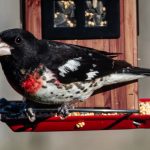Dogs and chickens possess distinct instincts shaped by their evolutionary history. Dogs, as natural predators, have a strong prey drive that compels them to chase and hunt smaller animals. Chickens, being prey animals, have an innate instinct to flee from potential threats.
Understanding these instincts is essential for maintaining the safety and security of both species when they share an environment. Dogs’ predatory instincts can be triggered by the sight, sound, and smell of chickens. Even well-trained dogs may pose a risk to chickens if not properly managed.
Chickens have a natural fear of predators, and perceived threats can cause stress and anxiety, potentially impacting their health and egg production. Recognizing these instincts allows for proactive measures to create a safe and harmonious environment for both dogs and chickens. Chickens are social animals that thrive in secure and stable environments.
They establish a pecking order within their flock and require a sense of security to feel comfortable and maintain regular egg-laying. Dogs, as pack animals, have a strong need for leadership and structure. Understanding these differences in social behavior is crucial for fostering peaceful coexistence between dogs and chickens.
By acknowledging and respecting the instincts of both species, effective strategies can be implemented to ensure their safety and well-being.
Table of Contents
- 1 Establishing a Secure Perimeter for Your Chickens
- 2 Using Visual and Auditory Deterrents
- 3 Training Your Dog to Respect the Chickens
- 4 Providing Adequate Exercise and Mental Stimulation for Your Dog
- 5 Seeking Professional Help if Necessary
- 6 Monitoring and Adjusting Your Strategies as Needed
- 7 FAQs
- 7.1 What are some effective ways to keep dogs away from my chickens?
- 7.2 Are there any natural deterrents that can keep dogs away from chickens?
- 7.3 Is it legal to harm or injure a dog that is attacking my chickens?
- 7.4 How can I train my own dogs to stay away from my chickens?
- 7.5 What should I do if a neighbor’s dog is repeatedly coming onto my property and harassing my chickens?
Key Takeaways
- Dogs and chickens have different instincts, understanding them is crucial for their coexistence.
- A secure perimeter is essential to protect chickens from potential threats.
- Visual and auditory deterrents can help keep predators away from the chicken coop.
- Training your dog to respect the chickens is important for their safety.
- Providing adequate exercise and mental stimulation for your dog can reduce their prey drive towards chickens.
Establishing a Secure Perimeter for Your Chickens
Here is the rewritten text with 3-4 Securing the Perimeter
Establishing a secure perimeter for your chicken coop and run is crucial in keeping your chickens safe from your dog. This involves ensuring that the fencing is sturdy and tall enough to prevent your dog from jumping over or digging under it. Regular inspections of the perimeter are also necessary to identify any signs of wear or damage that could compromise its integrity.
Optimizing Property Layout
The layout of your property plays a significant role in the safety of your chickens. For instance, if your dog has easy access to the chicken coop from your house, it may be challenging to control their interactions. Strategically placing the coop and run in an area that is less accessible to your dog can reduce the likelihood of unwanted encounters.
Creating a Safe and Comfortable Environment
Providing your chickens with a secure and comfortable living space can help reduce their stress levels and minimize the risk of conflict with your dog. This includes ensuring that the coop is well-ventilated, predator-proof, and equipped with roosting bars and nesting boxes. By creating a safe and inviting environment for your chickens, you can help them feel more at ease and less vulnerable to potential threats.
Using Visual and Auditory Deterrents

Visual and auditory deterrents can be effective tools for deterring dogs from approaching or harassing your chickens. For example, motion-activated lights or sprinkler systems can startle dogs and discourage them from getting too close to the chicken coop. Similarly, placing scarecrows or other visual deterrents near the coop can help create a barrier that signals to your dog that this area is off-limits.
In addition to visual deterrents, auditory deterrents such as ultrasonic devices or noise-emitting alarms can also be effective in deterring dogs from approaching the chicken coop. These devices emit high-frequency sounds that are unpleasant for dogs but are generally not audible to humans. By using a combination of visual and auditory deterrents, you can create a strong barrier that discourages your dog from engaging with your chickens.
It’s important to note that while visual and auditory deterrents can be effective in some cases, they may not work for all dogs. Some dogs may become desensitized to these deterrents over time, while others may not be affected by them at all. Therefore, it’s important to use these tools in conjunction with other strategies for managing your dog’s behavior around your chickens.
Training Your Dog to Respect the Chickens
Training your dog to respect the chickens is an essential part of creating a harmonious relationship between the two animals. This involves teaching your dog to understand that the chickens are part of the family and should be treated with care and respect. One effective way to do this is through positive reinforcement training, which involves rewarding your dog for displaying calm and non-threatening behavior around the chickens.
For example, you can use treats or praise to reward your dog for sitting or lying down calmly near the chicken coop without showing any signs of aggression or excitement. Over time, your dog will learn to associate being calm and relaxed around the chickens with positive rewards, which can help shape their behavior in a positive direction. It’s also important to set clear boundaries for your dog when it comes to interacting with the chickens.
This may involve using verbal commands or physical barriers to prevent your dog from getting too close to the chicken coop or run. Consistency is key when it comes to training, so it’s important to reinforce these boundaries consistently and ensure that all members of the household are on the same page.
Providing Adequate Exercise and Mental Stimulation for Your Dog
Providing adequate exercise and mental stimulation for your dog is essential for managing their behavior around your chickens. Dogs that are under-exercised or bored are more likely to exhibit unwanted behaviors such as chasing or harassing the chickens. By ensuring that your dog gets enough physical activity and mental enrichment, you can help reduce their desire to engage in these behaviors.
Regular walks, playtime, and interactive toys are all effective ways to provide physical exercise and mental stimulation for your dog. Additionally, engaging in activities such as obedience training or agility courses can help channel your dog’s energy in a positive direction and strengthen their bond with you as their leader. It’s also important to consider your dog’s breed and individual personality when it comes to providing adequate exercise and mental stimulation.
Some breeds have higher energy levels and may require more intense physical activity, while others may thrive on mental challenges such as puzzle toys or scent work. By understanding your dog’s specific needs, you can tailor their exercise and enrichment activities to ensure they are happy, fulfilled, and less likely to engage in unwanted behaviors around your chickens.
Seeking Professional Help if Necessary

Customized Training Plan
A professional trainer can also provide guidance on how to safely introduce your dog to the chickens and gradually acclimate them to each other’s presence. This may involve using desensitization techniques or controlled exposure exercises to help your dog learn to coexist peacefully with the chickens.
Addressing Underlying Behavioral Issues
In some cases, seeking professional help may also involve addressing underlying behavioral issues in your dog that are contributing to their interactions with the chickens. This could include issues such as anxiety, fear, or aggression, which may require specialized training techniques or behavior modification strategies.
Peaceful Coexistence
By working with a professional trainer or behaviorist, you can help your dog and chickens live harmoniously together. With patience, consistency, and the right guidance, it’s possible to create a safe and peaceful environment for all.
Monitoring and Adjusting Your Strategies as Needed
Finally, it’s important to continuously monitor and adjust your strategies for managing your dog’s behavior around your chickens as needed. This involves regularly assessing the dynamics between your dog and chickens and making changes to your management techniques as necessary. For example, if you notice that your dog is becoming overly fixated on the chickens or displaying signs of increased arousal, it may be necessary to revisit their training or implement additional management strategies such as increased supervision or physical barriers.
Additionally, as both your dog and chickens age and change over time, it’s important to reassess their interactions and make adjustments as needed. This may involve modifying their living arrangements, updating their training protocols, or seeking additional professional guidance if new challenges arise. By staying proactive and adaptable in managing your dog’s behavior around your chickens, you can create a safe and harmonious environment for both animals to thrive.
Regularly assessing their interactions and making adjustments as needed will help ensure that they can coexist peacefully and enjoy a high quality of life on your property.
If you’re looking for ways to protect your chickens from predators, you may also be interested in learning about how to keep geese as a form of protection. Geese are known for their loud honking and aggressive behavior towards potential threats, making them a great addition to your flock for added security. To learn more about geese and their role in protecting chickens, check out this article on how many eggs geese lay.
FAQs
What are some effective ways to keep dogs away from my chickens?
Some effective ways to keep dogs away from your chickens include installing a sturdy fence around the chicken coop, using motion-activated sprinklers or alarms, and training your own dogs to respect the chickens’ space.
Are there any natural deterrents that can keep dogs away from chickens?
Yes, there are natural deterrents that can help keep dogs away from chickens. Some examples include using citrus peels, vinegar, or cayenne pepper around the chicken coop, as dogs tend to dislike the smell or taste of these substances.
Is it legal to harm or injure a dog that is attacking my chickens?
It is important to check your local laws and regulations regarding the protection of your livestock from predators. In many places, it is legal to take necessary action to protect your livestock from harm, but it is important to do so within the bounds of the law.
How can I train my own dogs to stay away from my chickens?
Training your own dogs to stay away from your chickens involves consistent and positive reinforcement. You can use commands such as “leave it” or “stay” when your dogs approach the chicken coop, and reward them with treats and praise when they obey. It is important to supervise your dogs around the chickens until they have learned to respect their space.
What should I do if a neighbor’s dog is repeatedly coming onto my property and harassing my chickens?
If a neighbor’s dog is repeatedly coming onto your property and harassing your chickens, it is best to first try to have a civil conversation with the neighbor about the issue. If the problem persists, you may need to consider contacting animal control or local authorities to address the situation.
Meet Walter, the feathered-friend fanatic of Florida! Nestled in the sunshine state, Walter struts through life with his feathered companions, clucking his way to happiness. With a coop that’s fancier than a five-star hotel, he’s the Don Juan of the chicken world. When he’s not teaching his hens to do the cha-cha, you’ll find him in a heated debate with his prized rooster, Sir Clucks-a-Lot. Walter’s poultry passion is no yolk; he’s the sunny-side-up guy you never knew you needed in your flock of friends!







